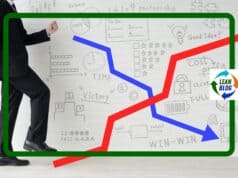I've had the chance recently to re-watch some of The Deming Library DVDs, thanks to my friends at CC-M Productions (found at www.managementwisdom.com). I'm watching some of the videos for the first time.
It's always a joy for me to watch these videos, produced in the 1990s featuring interviews with Dr. W. Edwards Deming and clips of his seminars.
In one video, there was a point that I don't recall from previous viewings. Dr. Deming was talking with Dr. Russell Ackoff about redesigning systems.
I'm paraphrasing, but Deming and Ackoff were talking about how if one is to try to change a system, how can you know what changes to make if you can't describe how you would completely re-design the system from scratch, given the chance?
Ackoff and Deming talked about a scenario where your factory or organization (or we could say a hospital) were destroyed tomorrow. How would you re-build it? How would you design it given no current state constraints or limitations? That should be your vision for any tweaking or re-design that you're doing on the existing system. Do you understand your system well enough to be able to articulate that vision?
I found that to be a very provocative and interesting idea. There's some element of that idea in the further lineage of Lean thinking — one concept that's familiar is the idea of the Future State Value Stream Map. This gives us vision for how the system “should” work if we were to redesign it (especially an “Ideal Future State” map, as opposed to a “Practical Future State.”).
Kaizen (continuous improvement) is an important concept, but we should often think about radical redesign (the word “kaikaku” in Japanese). Sometimes a number of small tweaks isn't sufficient for the level of redesign that's needed.
So this is somewhat grim, but imagine your workplace if it were destroyed tomorrow (nobody is hurt in the process). Do you have a clear vision of how you would rebuild it to be better?
Please scroll down (or click) to post a comment. Connect with me on LinkedIn.
Let’s build a culture of continuous improvement and psychological safety—together. If you're a leader aiming for lasting change (not just more projects), I help organizations:
- Engage people at all levels in sustainable improvement
- Shift from fear of mistakes to learning from them
- Apply Lean thinking in practical, people-centered ways
Interested in coaching or a keynote talk? Let’s talk.
Join me for a Lean Healthcare Accelerator Trip to Japan! Learn More










Sometimes we do need to think on a higher level to achieve the results we need. In cost cutting efforts, we always started with considering how we could cut the costs in half. It always brought out more creativity than just starting an incremental project of “skinning it up a little.”
Good thoughts!
Hi Mark,
To be honest the vision is clear. Working in transparent and urgency driven crisis management and building up the new BMW Plant Leipzig this has led to:
LockSchuppen http://mindbroker.de/wiki/LockSchuppen
“The Serendipity Park” (built on collective knowledge)
Cheers, Ralf
It’s a good to frame thoughts about future state scenarios with reference to the ideal future state. Lots of people seem to have trouble with this, but it allows you to clear away ALL the waste. In doing that, we sometmes see waste that we might otherwise not see through the lens of current constraints.
I’m thinking of a conversation we had on another site about transportation to and from clinics – value or waste? Blow it up and start over and maybe we can do away with transportation while still providing services. The value/waste question becomes clearer and we can be more effective in both kaizen and kaikaku.
I hoped Ackoff would come up when I saw the title of the post. Ackoff has tons of fantastic ideas. This is one.
Comments are closed.